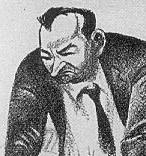

 |
|
The Lynching of Will James
|
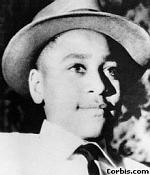 |
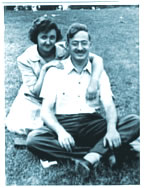 |
|
Julius and Ethel Rosenberg
|
The fifties were a great time to be alive in this country - Ozzie and Harriet, Ward and June, Jim and Margaret. Dad worked hard and earned a living, and Mom stayed home and took care of the kids. No one took drugs except the very dregs of society, and teenage pregnancy was nonexistent. Well, almost nonexistent. Some girls may have gotten pregnant, but their parents made sure they were safely married by the time the baby arrived. Abortion was not even to be thought about. Gays stayed in the closet where they belonged. Pornography was illegal; Tropic of Cancer, Fanny Hill, and Frank Harris's memoirs were only available in Europe, and if you had them, you kept them decently hidden. Even the Playmates of the Month had their pubic hair airbrushed out. Sitcom married couples slept in twin beds, and when Lucy somehow magically got pregnant, no one was allowed to say so. The Internet was not even dreamed of. Teacher led school prayer was accepted as a matter of course, and kids stood with their hands over their hearts and said the Pledge of Allegiance every day. That's how it was. And it was great. Wasn't it?
Well, not exactly. Certainly not if you were black, especially if you were a black who "didn't know his place." Jim Crow laws throughout the South made sure that black people were rigidly segregated in every aspect of daily life, from buses and trains to lunch counters to water fountains. Those who did not conform to the system were subject to beatings, house burnings, and lynchings. A fourteen year old boy named Emmett Till who was alleged to have whistled at a white woman (his friends said that he stuttered and the whistle was merely a mannerism to overcome his stutter) was brutally murdered by a white mob in Mississippi. White people who stood up to the Klan and their ilk were subject to such disciplinary measures as business boycotts and arson. Was it better in the north? Only marginally. Discrimination against blacks in hiring and housing was widespread, and, because of segregated housing, schools in many areas were almost as segregated as in the South. Few black women, North or South, had the luxury of staying home with their kids. They had to work to earn a living and, for most of them, the only work available was in other people's houses, cooking, cleaning, and caring for white women's kids. Their own children were cared for by relatives, or by neighbors or friends. There were no day care centers, and if there had been, they would not have been able to afford them.
Things were not so different for poor white women. They, too, worked long hours for low pay, and left their children with family or friends. Career opportunities for those middle class women who were not captivated by the Harriet Nelson stereotype were limited mostly to teaching and nursing, both of which entailed low pay and subservient roles to the male doctors and administrators. Women who fought their way out of the "female job" ghetto had to face severe and blatant discrimination in education and then in their chosen professions. It was a given that men earned more than women in the same job. After all, men had families to support. Women worked for fun, or because they were unfeminine, or because they couldn't get a man and get married and raise a family, as God intended them to do.
And then there was Senator Joseph McCarthy and his band of dedicated Communist hunters. Almost single handedly, Senator McCarthy engineered a life of fear for anyone with even slightly left of center views. Senator McCarthy believed there was a Communist under almost every bed, and that they must be hunted down relentlessly. Union members, professors, writers, actors, musicians, anyone who did not toe a very straight political line of his choosing, were targets of his wrath. People who were called before his committee were strongly pressured to admit their guilt, and to name names of others with similar views. In fear, many did inform on their neighbors, their coworkers, their friends, even members of their own families. The net spread wider and wider, and no one was immune from suspicion. Even President Eisenhower, former First Lady Eleanor Roosevelt, and Chief Justice of the Supreme Court Earl Warren came under public scrutiny. Suspected "communists" were harassed in their homes, fired from their jobs, and blacklisted so that future employment was not possible. Teachers were not allowed to teach; actors were not allowed to act; writers were not allowed to publish their work. Families were torn apart. Lives were ruined.
The ultimate fear for those who were openly left of center was embodied in the fate of an obscure Jewish couple from the Bronx - Julius and Ethel Rosenberg. Julius had a small radio repair business; Ethel was a housewife and mother of two small children. They were certainly Communists, but they were very unlikely spies. However, their guilt or innocence is not germane to this essay. What is true is that their deaths had a chilling effect on dissent in this country. If the Rosenbergs could be executed, so could anyone considered to be "un-American" - socialists, union organizers, pacifists, civil rights advocates, as well as Communists and what were sometimes referred to as "fellow travelers" - those who espoused some aspect of what was considered the Communist agenda, without themselves actually being Communists.
The Smith Act made it illegal to be a member of the Communist Party. In order to serve in the military or be admitted to many colleges, one had to swear a loyalty oath: "Do you swear that you do not advocate the overthrow of the American government by force or violence?" It did not seem to occur to anyone that it was unlikely that one who was plotting to overthrow the American Government would refuse to swear an oath. The ones who suffered from these intimidation tactics were those who refused to take the oath, not because they were disloyal, but because their principles would not allow it. It was a frequent topic of discussion between my friends and me who were getting close to college age. Would we knuckle under and take the oath? Or would we stand up and say, "I don't believe you have the right to ask me that question and I refuse to answer it." Was it worth the principle not to be allowed to attend college? When the time came, I took it. I was truthful. I did not advocate the overthrow of the government. Still, being forced to take the oath stuck in my craw - and still does.
I was the child of left wing parents. My father had actually been a Communist and a union organizer back in the thirties, but had left the Party after returning from service in the War. I don't think my mother (my stepmother, actually, but the only mother I had ever known) was ever actually a Communist. Certainly neither of them was an advocate of the forcible overthrow of the government. They were, however, among the early organizers of the Congress on Racial Equality (CORE), and they hung around with a very disreputable (by J. Edgar Hoover's standards) bunch of pacifists, artists, blacks, gay people (yes, Virginia, there were gay people even in the fifties!) and other antiestablishment types. My mother was also a Jew - always a focus of suspicion for the witch hunters. As suspected Communists, our family was subject to constant scrutiny by the FBI. Our phone was tapped. Sometimes our house was invaded and searched in our absence. Sometimes FBI agents knocked on our door and harassed us, asking us intrusive questions about our activities, about our friends, and about our friends' activities.
My friend Laura, the daughter of a labor historian (gee, how can you get more subversive than that!), remembers a time when she was seven or so, and two FBI agents came to their door and asked for her father. Her mother informed them, truthfully, that he was out of town. "We're writing that down," one of the agents said in a disbelieving and hostile voice. "You say he's out of town. We're writing that down." Laura was terrified. She knew, you see, about two little boys named Michael and Robert Rosenberg whose parents had been arrested, accused of treason and put to death. Would they do that to her parents? Would she be an orphan and have to go and live with her aunt? She knew that it could happen. She could see her mother's unspoken fear as the FBI men drove away. Her mother knew, as Laura knew, that those men could come back and take her father away. And, if they did that, he might never come home again.
I had an uncle who had been a Communist when he was in college in the thirties. Since then he, like my father, had put on a uniform and gone into combat in the service of his country, but that did not deter the Communist under every bed crowd. His sister, my aunt, who was completely apolitical, was nevertheless harassed by the FBI, probably either in error or as a tactic to try to frighten her brother. In letters, the FBI threatened to inform her employer (she was a Government employee) of her Communist leanings. She panicked and, unfortunately told her former husband, who told his father. Her father-in-law subsequently used this in court to show that she was an unfit mother and wrested custody of her child from her. There was no defense from these accusations - if you were accused, you were guilty. If you were guilty, you had no right to your job, nor even to your child.
The idea was to frighten people into silence. And it worked. Protests did not come to a standstill, but they were muffled. Frank and free discussion of unconventional political ideas was not possible. Even those who apparently shared one's views were not safe. Too many of those had turned on their friends - Elia Kazan, Howard Fast, Josh White. The Rosenbergs were betrayed by Ethel's brother, David Greenglass (who has recently admitted that a key part of his testimony against them was a lie.) It was safer to say nothing, to lie low, and hope that no one would notice one. There were, of course, those who figuratively flipped the bird to McCarthy and his cohorts, from Edward R. Murrow to Dashiell Hammett and Lillian Hellman to Eleanor Roosevelt. These were true heroes of the times. Unfortunately, they were rare.
Okay, you may be saying. So the fifties weren't as idyllic as they looked on Leave It To Beaver. It was all a long time ago. What's past is past; what's done is done. Right? Well, perhaps not. Santayana reminded us that those who do not learn history are doomed to repeat it. There is a group of people in the current administration who appear to think that a return to McCarythist tactics is a fine idea.
These goons want the right to enter homes without a warrant with the flimsiest of excuses. They want to hold people without trial, without even the benefit of a lawyer, for indefinite periods if they suspect that they may be terrorists. Or connected to terrorists. Or connected to someone who once knew someone who may have considered being a terrorist. They want to be able to track every person's every move - what they buy, what they read, what they watch, where they go on the Internet. They want to encourage people to inform on their neighbors, friends and families if they see or hear anything they think is possibly suspect.
Well, you say, 9-1-1 happened. Thousands of people died. We are justified in trying to protect ourselves. Aren't we?
All I can say to that is that I do not trust this or any government to stop with those who are genuine or even probable terrorists. I foresee exactly what happened fifty years ago repeating itself. "Well, he may not be a Communist, but he is a fellow traveler and, as such, gives aid and comfort to our enemies." Today, it goes: "Well, he may not be a terrorist, but he has an Arab name and he worships in a mosque, and his wife wears one of those funny long robes. He probably knows a lot of terrorists. So we're justified in jailing him and making him tell us what he knows." Do you see a parallel?
Jesus said, "Who saves his life will lose it, and who loses his life for my sake will save it." If we toss the Constitution aside to try to protect ourselves from terrorists, we will lose the very thing that we say we are protecting. We will save our lives, only to lose our freedom.
I have been there before. I will not go back. Not while there is breath left in my body.
Sheba
1/25/03
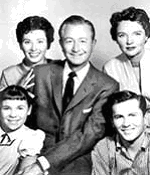 |
|
Father Knows Best
|
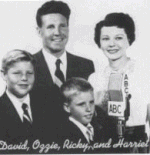 |
|
Ozzie and Harriet Nelson
|
 |
|
Leave It To Beaver
|
On the Left, by Sheba
Designed by Alllie
[an error occurred while processing this directive]
